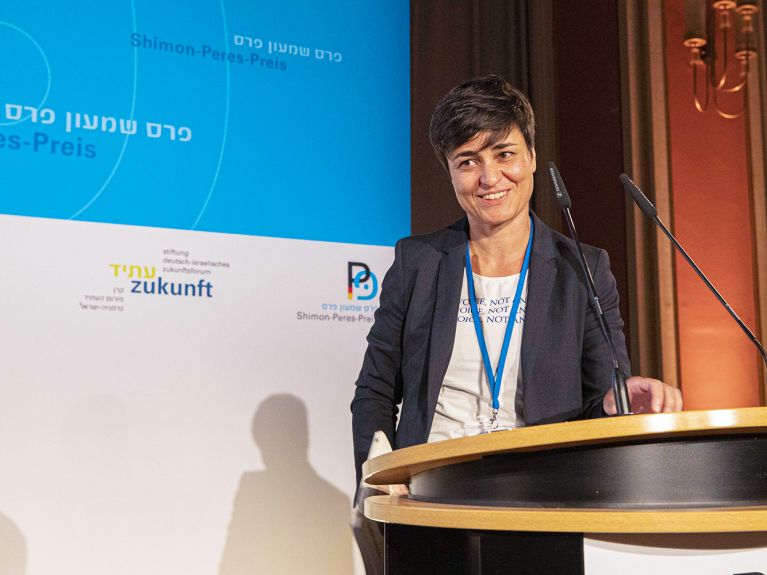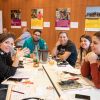Cooperation, not isolation
After corona: Tamara Or of the German-Israeli Future Forum talks about the opportunities and challenges of bilateral relations.

Tamara Or, Executive Chairwoman of the German-Israeli Future Forum (DIZF), sees the corona crisis as both a catalyst and a magnifying glass. It is not only accelerating developments, but also revealing what was not good in the past. Or believes the crisis holds opportunities for even closer cooperation between Germany and Israel – and for a better future.
Ms Or, imagine it were now already May 2021. How would bilateral relations between Germany and Israel have changed?
What our world looks like in one year’s time will largely depend on how we act now. The future is shaped in the present. German-Israeli relations are an impressive success story against the background of the Shoah and the Nazi dictatorship. However, we had already reached a turning point, even before the outbreak of the pandemic. Germany and Israel increasingly disagree on fundamental positions of foreign and security policy. At the same time, however, there continue to be a very large number of ties between the two countries. If we want to successfully take our relations forward into the future we will need to rethink our cooperation. Today, German-Israeli relations do not take place in a glittering bilateral bubble, but also reflect global trends and issues with all their intricacies. The pandemic is like a magnifying glass here. It makes visible societal and political fissures that already occurred long ago.
Global challenges can only be solved globally – the pandemic proves that once again.
Do you also regard the corona crisis as an opportunity?
Crises are catalysts. They accelerate developments that have already begun. The question now is which of these developments will grow stronger under the cover of the pandemic. Unfortunately, crises often increase the need for withdrawal. Curling yourself up into a ball and keeping the world at bay initially seem to promise security and protection. Ultimately, however, the walls we build ourselves cage us in and restrict our freedom of action. Global challenges can only be solved globally – and the pandemic proves that once again.
Does that mean we will address other global problems together – for example, climate change –after the corona crisis?
I can only hope that. Climate change, refugees and migration, terrorism and security policy are all issues that cannot be solved by one academic discipline or one of the world’s countries acting alone. It may be bad news for the prophets of nationalism that we will only be able to solve our problems by working together with other countries. I can see a wonderful message in that: we are not alone with our challenges. We can and will only succeed in realising innovations and developing solutions if we work together.
How is the corona crisis changing your work?
In the course of just a few weeks we at the German-Israeli Future Forum have begun thinking in much more digital terms than we did only three months ago. The crisis is helping us to discover new opportunities here. Since 2019, in so-called matchmaker seminars, for example, we have been training young employees from both countries how to initiate German-Israeli cooperation projects or advise others about their implementation. Before the crisis these matchmakers were only known to a relatively small circle of people. Using digital formats, we now suddenly reach thousands of young people.
At the same time, we are facing new challenges. We are the only bilateral foundation that shapes German-Israeli relations mainly within the context of democracy promotion in both countries. Our target group is young specialists and professionals. Many of them are active in civil society organisations that were already underfinanced before the pandemic. Now especially, support is urgently needed for the many volunteers and freelancers on whose commitment and creative drive we all depend.
Are there any projects among those you fund that have become more relevant and necessary than ever before?
In the Future Forum we want to take German-Israeli relations forward by placing the global perspective more firmly at the centre of our projects. For that reason we are currently discussing how we as a foundation can make an even better contribution towards realising the UN Sustainability Goals. I am convinced that German-Israeli collaborations can make an especially successful contribution to achieving the Agenda 2030 Goals – that applies just as much to research partnerships as it does to our work with civil society initiatives in both countries.
Could there be a shift towards isolationism that threatens your work and common ideals after the crisis?
These trends emerged long ago and unfortunately are very strong. It’s now up to us. We must recognise the risk that lies in the acceleration effects of the pandemic and seize the opportunity to put ourselves at the formative head of the changes. Then, in May 2021, we will celebrate the 56th anniversary of German-Israeli relations in the awareness that we in both countries continue to be well on the way to a democratic future.


